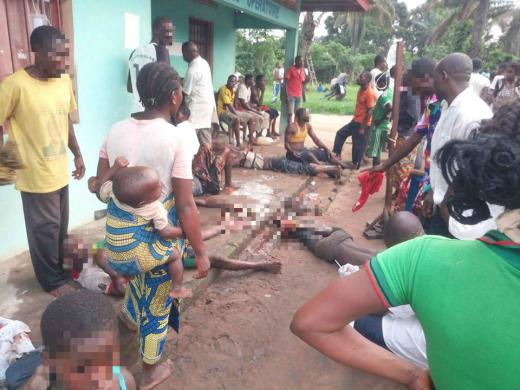89 Soldiers, Others To Face Trial Over Massacres In DR Congo
The 89 persons are facing trial for an ethnic massacre which they orchestrated in 2018.

The trial of 89 persons accused of involvement in the 2018 massacre of 535 people in Yumbi town, northwest Democratic Republic of Congo, has been fixed to commence on May 26, 2021.
The accused persons include soldiers and police officers, 70 of whom are currently detained in the Ndolo prison while the others are held in various detention facilities around the country.
The prejudicial investigations into the massacres were supported by the United Nations, which in a report after preliminary investigations had concluded that the massacres are crimes against humanity.
On December 16, 2018, hundreds of ethnic Batende tribesmen armed with hunting rifles, automatic weapons, knives and machetes, stormed Yumbi town and killed at least 170 people, mostly ethnic Banunu.
A day after that, they attacked the villages of Nkolo II and then Bongende. A total of 535 people were killed in the various attacks and 111 others were injured.
The attackers damaged, destroyed, and looted more than 1,500 houses, health centres, and schools, forcing about a third of the 16,000 population of the localities to flee to neighbouring Congo Brazzaville.
The ostensible cause of the violence was the secret burial of a Banunu customary chief on private land claimed by the Batende on the night of December 14, said Batende leaders in a UN report.
The region has long experienced rivalries between the two groups over customary land rights.
A UN investigation later established that the attacks were facilitated by the absence of state action to prevent them adding that the “provincial authorities seemed to have fallen short of their responsibilities to protect the population.”
The UN Group of Experts reported that the assailants targeted their victims based on their ethnicity or perceived ties to Banunu, while sparing others.
The attackers sometimes mutilated and disfigured their victims, including women and children, and took body parts with them. Attackers used gasoline to torch homes and other structures, looting and carting away victims’ belongings.
To date, tension between the two ethnic groups, Banunu and Batende remains palpable.
Support Our Journalism
There are millions of ordinary people affected by conflict in Africa whose stories are missing in the mainstream media. HumAngle is determined to tell those challenging and under-reported stories, hoping that the people impacted by these conflicts will find the safety and security they deserve.
To ensure that we continue to provide public service coverage, we have a small favour to ask you. We want you to be part of our journalistic endeavour by contributing a token to us.
Your donation will further promote a robust, free, and independent media.
Donate HereStay Closer To The Stories That Matter




